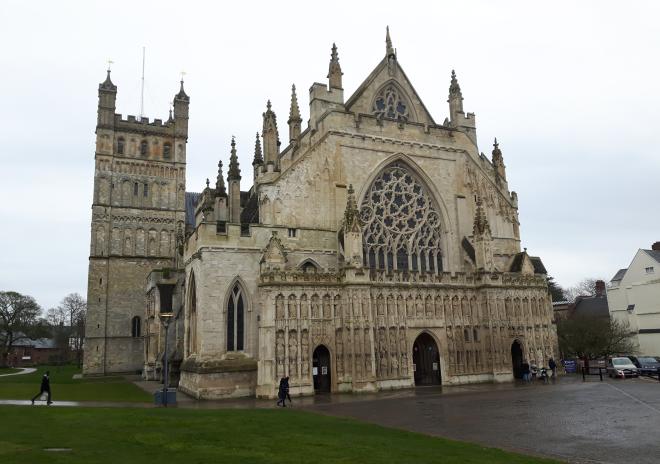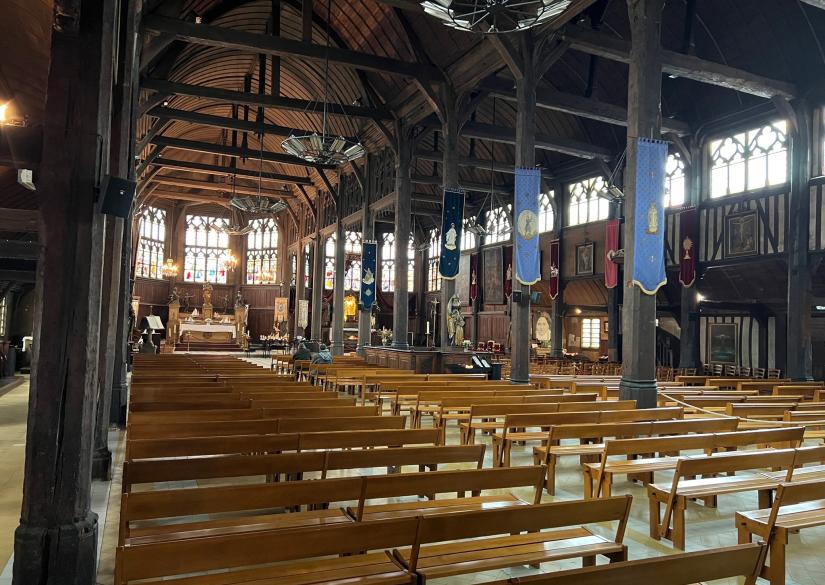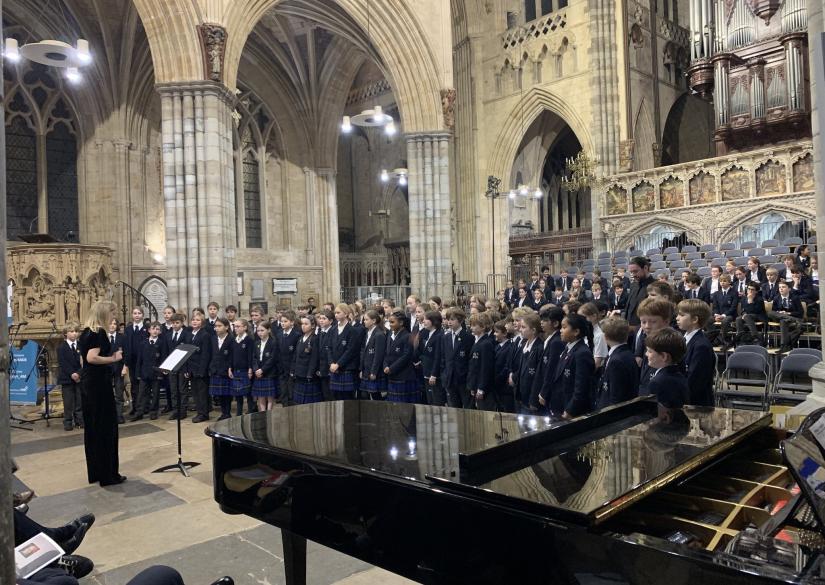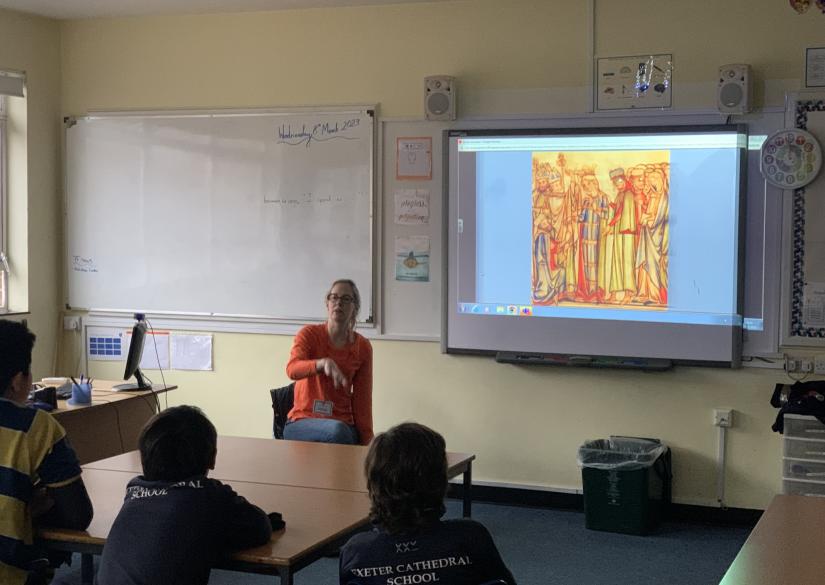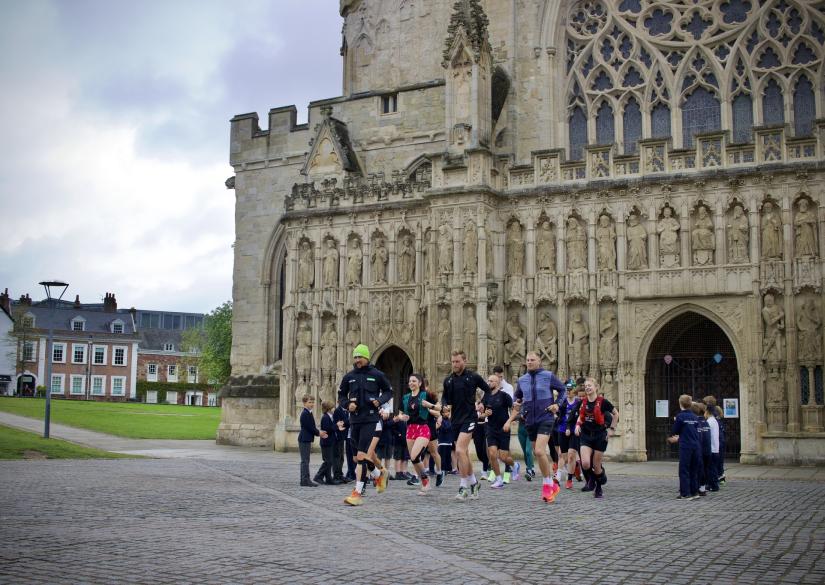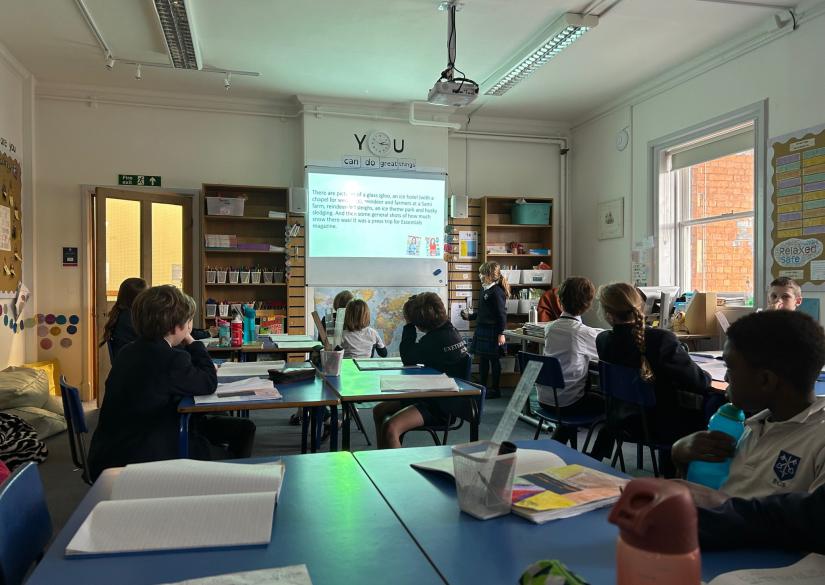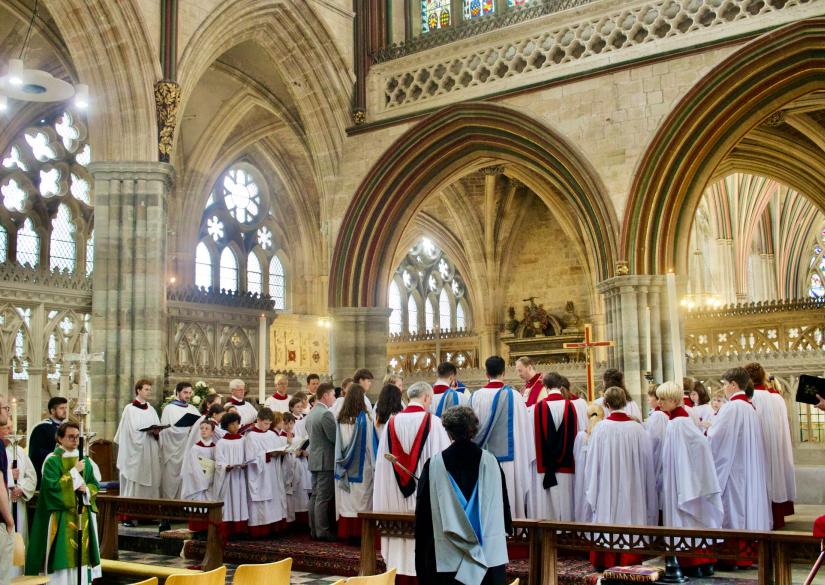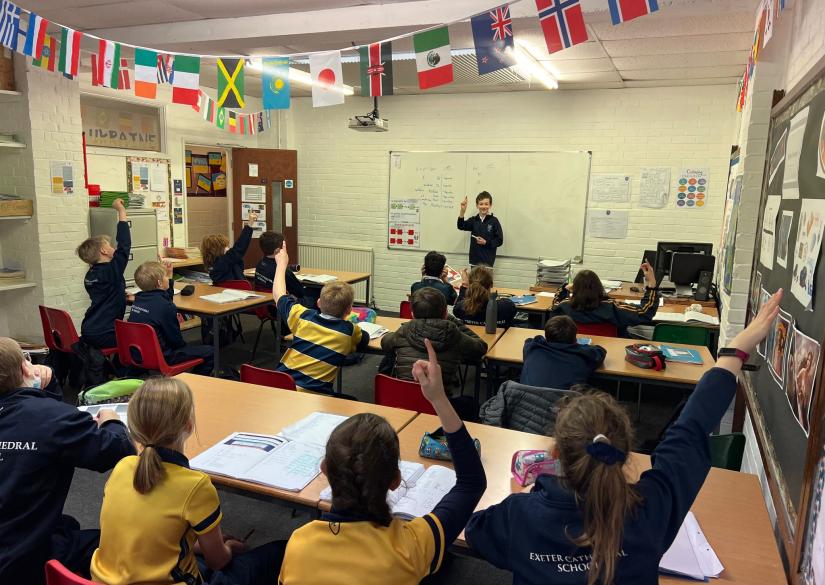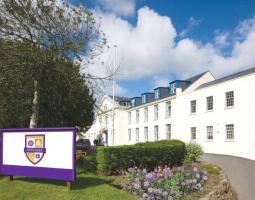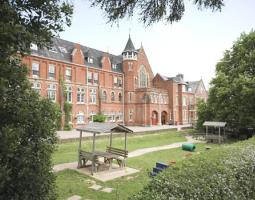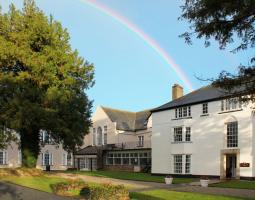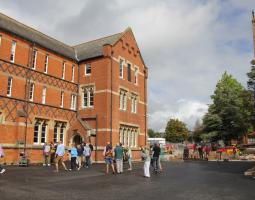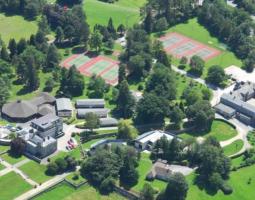Exeter Cathedral School
Programs and prices, tuition fees in Exeter Cathedral School
Nursery Program
- Age – three or four years,
- The duration of study is up to two years.
The kindergarten program offers the youngest pupils a caring and varied atmosphere for as long as they feel comfortable: three to six hours in small groups. Under the guidance of qualified teachers who are in love with their work, children spend a lot of time in a developing environment and using various methods and materials: from needlework and drawing to studying insects and acquiring basic life skills.
The day in kindergarten begins with the reception of children at 08:45, followed by morning lessons, lunch and afternoon activities. Students can stay on campus until 12:15 p.m. or 3:15 p.m. It is also possible to start classes at 12:15 and end at 15:15. Children who cannot be picked up at 3:15 p.m. can stay in the kindergarten until 6:30 p.m.
Junior students have close ties with the rest of the school, enjoy games and gatherings together, take part in trips, Christmas performances and major events.
Pre-Prep Program
- Age – from four to seven years,
- The duration of the training is three years.
The pre-prep curriculum corresponds to the Early Years Foundation and Key Stage 1-2.
Part of the Early Years Foundation includes seven areas of learning and development. Three main areas are particularly important for awakening children's curiosity and enthusiasm for learning, for developing their ability to learn, and for forming relationships. The main areas are:
- Communication & Language,
- Physical development,
- Personal, social and emotional development.
Educators support students in an additional four areas, whereby these three main areas are strengthened and applied:
- Literacy
- Mathematics
- Understanding the world,
- Expressive art and design.
Throughout the day, with a carefully planned schedule, children benefit from a balance between academic and play activities. Working with a friend, in a small group, or as a class, they learn to collaborate, listen and ask questions, follow their own ideas, and thus develop into independent learners.
The focus of each day is on teaching phonics, so that children learn to read and write quickly. Learning takes place both indoors and outdoors through play and exploration.
The schedule includes weekly music and physical education lessons, which are conducted by specialist teachers of the preparatory school. Thanks to the contact with the teachers, a smooth transition from the preliminary department to the preparatory department is built.
Key Stages 1-2 are a creative curriculum that makes meaningful connections between academic subjects and real life. Classes are organized not only in the classrooms, but also during excursions, additional events and attending lectures by guest speakers.
Prep Program
- Age — from 7 to 13 years old,
- The duration of the study is six years.
The Prep program is aimed at the all-round development of children and strengthening their skills, knowledge gained in the early stages of development. Particular attention is paid to the subjects and interdisciplinary context, the individual characteristics of each pupil.
The curriculum for grades 3-8 includes a wide variety of disciplines studied:
- English language
- Geography
- History
- Mathematics
- Modern Foreign Languages,
- Art & Design,
- Music
- Religion
- Science
- Physical education
- PSHE: Personal, Social, Medical, and Economic Development.
Students arrive at school at 8:00 a.m. and stay in class until 3:45 p.m., then they can devote time to circles and sections until 6:30 p.m. Exeter Cathedral School's extracurricular life allows students not only to develop academically, but also to devote time to their interests: art, sports, charity, science, or others.
Description of Exeter Cathedral School
- Location: Exeter, England,
- Founded in: c. 1179,
- Number of students: 275,
- Language of instruction: English,
- Type of study: blended.
Exeter Cathedral School is a Church of England school offering programs for students from 3 to 13 years old.
The exact date of its foundation is unknown, but the first mention of the chorister school dates back to 1179, when 26 boys were taught here, who sang services in the cathedral every day. From the 1960s, the school began to accept children who did not belong to the choral arts, and after another 30 years, education became available to girls - the educational institution is still a co-educational school.
Now Exeter Cathedral School is a thriving preparatory school with about 275 girls and boys. It offers a broad and balanced education based on Christian values and the development of each pupil as an individual. Children of all faiths and their lack thereof are accepted for education, as the principle of learning is diversity, tolerance and kindness.
Educational process
Outdoor lessons add variety to the daily routine – when the weather is nice, children study at the Forest School, play in outdoor areas and explore the world around them with what they see and can touch. This experience is very important in the formation of a child's personality, expanding his horizons and acquiring household skills.
Accommodation, meals, prices
Exeter Cathedral School has a small and cozy boarding house, Eyre House, located on the east side of the campus. It can accommodate up to 40 students, boys and girls live in separate corridors. It's no wonder that students are happy to stay here – it's a fun and friendly place with comfortable bedrooms, a living room, a room for self-study and games, a bistro for preparing snacks and drinks, The eight pianos provide students with a wide range of activities and places to socialize with friends.
Students can choose between full, weekly and flexible boarding, i.e. live in the unit throughout the year, weekly or stay for a few nights a week. Caring staff will always be next to them, ensuring the safety and comfort of pupils around the clock.
Meals are organized with the help of the catering company Thomas Franks Ltd. The three-week menu consists of numerous and varied dishes: breakfasts, meat and fish products, fruits and vegetables, salads, hot soups and much more are provided to students every day.
Activities Exeter Cathedral School
One of the pride of the Exeter Cathedral School is the choir, which involves 36 boys and girls – students in grades 3-8. They perform regularly in the cathedral alongside adult choir members, practising their skills and musical education as part of the Exeter School programme. There are weekly wellness meetings between the pastoral staff and the cathedral's music team. Choristers are not only actively involved in the life of the school, but also receive professional training in singing together with professional soloists, taking advantage of world-class musical training and unparalleled opportunities.
Students' extracurricular activities are all about participating in groups that develop their leadership skills and individual interests. Some of them are:
- School Board – 14 students from each year group in grades 2 through 8, representing their classmates; They discuss issues of concern to them with teachers and staff twice a semester,
- ECO Committee – 14 representatives of each class dealing with campus environmental issues: waste recycling, tree planting, garbage sorting and others,
- Boarding Board – Students who pay attention to residential issues,
- Food Committee – 14 students in each grade discussing menus and nutrition twice a semester,
- The Student Leadership Group is a Year 7 student who meets monthly with the principal to discuss the day-to-day life of the school. Apprentices have responsibilities that include being responsible for managing student associations, supporting staff on duty at the playground, and organising events, benefit concerts.
Children can develop their interests and devote time to hobbies at extracurricular meetings with subject teachers. These classes are similar to the additional lessons of the school curriculum, but they cover various topics that are not included in the curriculum, expanding the horizons.
Advantages
- Exeter School is a member of the BSA Boarding School Association, the Association of Choir Schools,
- The only school in Exeter with a residence,
- The development of children in a mildly Christian environment in which the values of love, tolerance, acceptance and compassion are instilled,
- A varied leisure program: clubs, excursions, participation in events and much more,
- Rated "Excellent" by the Independent Schools Inspectorate in 2019,
- The average class size is 15 students,
- 84% of students receive scholarships.
Facilities and equipment at Exeter Cathedral School
Exeter Cathedral School now operates in the Chapel, built in 1870, in Exeter city centre. Despite its central location, the school boasts a natural area prepared for safe walks and outdoor recreation.
A large, bright and modern kindergarten is located next to the preparatory department in the Cathedral. The kindergarten has an indoor outdoor playground, children can take full advantage of the beautiful forest garden, outdoor playground with crumb rubber coating and a variety of obstacles. The playground is ideal for running, jumping, scootering and cycling, while the forest garden is a natural space with plenty of resources to develop teamwork, creativity and imagination skills.
The preparatory center is located in a former canonical building of the XIX century. It is here that the children of the preparatory groups attend their daily classes under the guidance of dedicated and highly qualified staff. The classrooms are equipped with educational materials for needlework, reading, drawing, counting and other activities aimed at the versatile development of pupils.
The terraced garden, which is available to all students, is used for a variety of educational opportunities in a playful format: search for dinosaur bones, insect hunting and plant research activities, art and creativity activities, and others.
Exeter Cathedral School has its own bus fleet, which is used to transport students during extracurricular activities and excursions, taking them home after school.
Admission dates and extra charges
The academic year consists of two semesters and lasts from September to mid-July: students attend academic classes on weekdays, rest on weekends and days of national and international holidays. The Extended Day Club, where children can stay during their parents' working hours, is open daily from 7:30 a.m. to 6:30 p.m.
An approximate list of additional costs:
- Registration fee upon admission,
- Deposit upon confirmation of a seat in the class,
- Accommodation in the residence and meals,
- Some excursions and off-campus activities,
- Health insurance,
- School transport.
Enrolment process
Exeter Cathedral School advises requesting information from the Admissions Office and visiting the campus before applying for admission: this will help families of prospective students assess the atmosphere of the school, get to know the teachers and curriculum, tour the campus, and be confident in choosing a place for their child. A prospective student can attend a trial day in which they can attend a few classes and interact with those already enrolled. students, subject teachers and the principal.
The registration procedure involves filling out an online form or document on campus. Parents of the student must attach his/her personal documents:
- Passport
- Birth certificate,
- Visa or residence permit,
- Health insurance and vaccination certificates,
- School reports for all years of schooling, if available.
Applicants are required to pay the registration fee and make a deposit when signing the last documents for the registration of the child.
Perspectives
Exeter Cathedral School graduates specialists who have created many world-famous works of art, reached heights in sports and made changes in the world order. Among them are Chris Martin , a member of the musical group Coldplay, David Webb, a member of the English National Opera, Gile White, the management of the Hampshire Cricket Club, and others.
The graduates of 2022 have chosen the following institutions for further academic paths:
- Wells Cathedral School,
- Wellington School,
- Blundell’s School,
- Exeter School,
- The Maynard School,
- St Wilfred’s School,
- Stover School,
- Taunton School.
Entry requirements, how to apply, what is required to enrol
Prospective students need to provide:
- Personal documents: passport and birth certificate, health insurance, visa or residence permit,
- School reports, if available.
Admission is subject to availability and based on the results of a meeting with the admissions committee.
Scholarships Exeter Cathedral School
Exeter Cathedral School provides students with funding opportunities:
- Choristers receive a stipend awarded by the dean and the head of the cathedral – 25% of the cost of the program,
- The ECS Awards is a scholarship that rewards dedicated, talented students entering Grade 7. It is awarded for achievements in several areas: music, sports, visual and performing arts, and studies.
A few more funding options other than scholarship awards:
- The government's Kindergarten Voucher Program, which provides families with children with 15 free hours of attendance per week,
- A 10% discount on the monthly fee for younger siblings of students, as well as for children from military families.
Institution on the map
Residence permits, citizenship and other services
- Guardianship services during the studies
- Student supervision
Review about Exeter Cathedral School
Recommendations on when to apply
| Language courses, schools and children's language camps | Primary and secondary education - private schools | Preparation programmes for entering universities - higher education | Higher education (after completing accredited programs A-level, IB, High School) - Bachelor, Master, MBA |
| - we recommend to apply 6-9 months before the start of the course (some camps and schools offer discounts for early booking or for lengthy study programs) - there are some very popular and high demand children's camps, where the applications need to be submitted 1 year in advance (in particular Switzerland , Great Britain , USA , Canada , Austria) | - we recommend to apply one year before the start of the training program, - some schools have a specific time frame (September-November - please specify an individual school) - some schools require tests in several stages (UKISET, internal tests of the school: English, mathematics, logics, subjects, interview, some require a personal visit) | - we recommend to apply one year before the start of the program, - for Foundation and Pathway programs, IELTS and TOEFL certificates are usually required, respectively | - recommended submission one year before the start of the program, - the deadline normally closes in January, for TOP HEIs and, as a rule, in March in other universities - for a bachelor, a Foundation or Pathway preparatory program a completed A-level, IB, High School + IELTS / TOEFL are required - for Masters you need a graduated higher education, in some cases you need a pre-Masters program - MBA requires completed higher education, work experience preferably at least 2-3 years, etc. |


